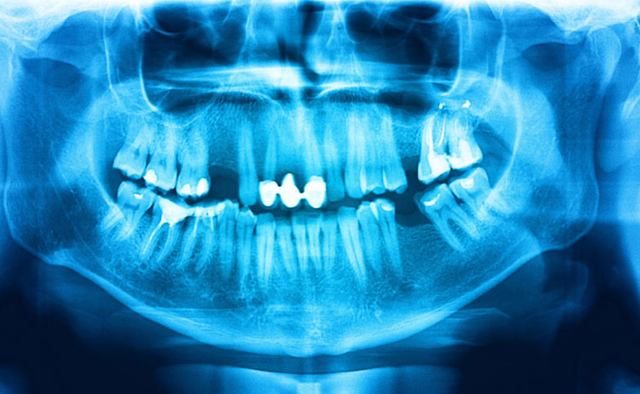

| Online: | |
| Visits: | |
| Stories: |
Scientists Confirm That 67% Of Wisdom Teeth Removals Are Unnecessary
by Jeffery Williams; Healthy Holistic Living
A lot of you reading this have probably had one or more of your wisdom teeth removed at some point in your lives. Our dentists tell us that we need to get these teeth taken out if we want to avoid major dental issues.
However, there are some people out there that claim that many of the wisdom tooth removal procedures done in this country aren’t actually needed. If that’s true, thousands of people are going under the knife for no good reason. But are these claims true?
The Stats
Let’s look at the numbers around wisdom teeth. Dental professionals extract around 10 million wisdom teeth every year. It costs between $1000-$3000 to get all four wisdom teeth extracted, which means this procedure generates around $2.5-$3 billion dollars in revenue each year.
A study from one journal estimated that around 67% of wisdom teeth removal procedures were unnecessary. In fact, the same journal found that out of 10 million wisdom teeth removals, only 20 were actually necessary (1). Dental experts, to the contrary, say that between 70%-80% of wisdom teeth need to be extracted. (2)
Why Do We Have Wisdom Teeth Anyway?
If so many people get their wisdom teeth removed, why do we have them in the first place? The reason is unclear, but some anthropologists think that this extra set of molars helped our ancestors process their tough, chewy diets. Since ancient humans were eating nuts, leaves, and meats, they needed some extra molar strength to reduce the burden on their teeth (3).
However, our ancestors also had larger jaws than we do today, jaws that could accommodate an extra set of molars. Over time, we developed tools (like forks!) and techniques to make eating easier and food softer, so we no longer needed our super jaws to process food.
When conditions in our environment change, our bodies often change over time to adapt; in this case, our jaws became smaller since we no longer needed the extra chewing power. As our jaws shrank, our wisdom teeth suddenly became the odd men out.
Hence, many of our wisdom teeth now become impacted or misplaced as we come of age, which is why many dental experts recommend that people get these teeth removed.
Why do Dentists Say We Need to Get Our Wisdom Teeth Removed, Then?
It’s definitely possible for wisdom teeth to grow in correctly and problem-free. Wisdom teeth can be allowed to grow in if they are growing in the correct position, don’t hurt, and don’t have any other dental problems associated with them. However, the reality is that they often don’t.
Wisdom teeth are often impacted, which means that they are growing in horizontally and don’t have room to grow correctly. Even if wisdom teeth are positioned correctly, they can be problematic if there’s too little room for them to emerge, potentially causing crowding and dislodging other teeth.
Dentists say that wisdom teeth can be problematic when they grow in too because they are difficult to properly clean, making them more susceptible to cavities and tooth decay (4).
However, some say that these problems aren’t natural problems and can be avoided with proper precautions. One researcher argued that the reason our wisdom teeth don’t have room to grow in is that our diets are so out of whack that our jaws can’t develop properly.
Without the proper nutrients, the theory goes, our jaws experience stunted growth, which doesn’t allow our wisdom teeth the room to grow in. This same researcher observed that native tribes, who consume a much healthier diet than Americans do, did not experience the amount of wisdom teeth issues that we do, suggesting that a large part of avoiding wisdom teeth issues stem from our diets.
What are the Risks of Getting My Wisdom Teeth Removed?
Since getting your wisdom teeth removed is a surgical procedure, there are inherent risks to consider before agreeing to the procedure. Since wisdom teeth removal requires the use of anesthesia, there is a small risk of death or complications related to anesthesia.
Wisdom teeth extraction also poses the risk of damaging the jawbone, depending on how securely the tooth is bound to the jaw. When the wisdom teeth are extracted, the tooth socket requires time to close up. As a result, the socket is at risk for infection or inflammation, what is called dry socket, if food debris or bacteria become lodged in the socket. (6)
Teeth have nerve endings, so there is a small risk that extraction could damage the nerve ending, causing permanent numbness in the jaw. It is normal for the surgical site(s) to bleed for 24 hours, but there is a risk for more severe bleeding after the surgery.
In the most serious instances, wisdom tooth extraction can cause heart problems. How? Well, if bacteria enter the surgical site and make their way into the bloodstream, they can travel through your circulatory system all the way to your heart, where they can damage tissue and cause a host of issues (6).
So What’s the Verdict?
So should you get your wisdom teeth removed or not? Well, it depends. If your wisdom teeth are growing in properly and there’s room for them, there’s not necessarily a reason to remove them, so long as you’re committed to cleaning them thoroughly.
However, you should ultimately listen to your dental professional if your teeth are impacted or crowded. Despite the naysayers, incidents of complications are extremely rare, so getting your teeth removed is not a death-knell.
In the end, most of the issues surrounding wisdom tooth extraction can be avoided with proper maintenance and oral care. But if you don’t want to face the risks associated with anesthesia and any surgical procedure, don’t be afraid to voice your wishes.
Article sources:
Moisse, Katie. “Parents Sue After Teen Dies During Wisdom Tooth Surgery”. ABC News. http://abcnews.go.com/Health/Wellness/wisdom-tooth-surgery-wise/story?id=15152980. N.p., 2017. Web. 14 Feb. 2017.
Rabin, Roni. “Expert Opinion Is Changing On Having Wisdom Teeth Extracted”. Nytimes.com. http://www.nytimes.com/2011/09/06/health/06consumer.html?_r=0. N.p., 2017. Web. 14 Feb. 2017.
Cooper, Rachele. “Why Do We Have Wisdom Teeth? » Scienceline”. Scienceline. http://scienceline.org/2007/02/ask-cooper-wisdomteeth/. N.p., 2017. Web. 14 Feb. 2017.
“What You Should Know About Wisdom Teeth Removal”. Jeffersondentalclinics.com. https://www.jeffersondentalclinics.com/blog.html/2014/10/09/what-you-should-know-about-wisdom-teeth-removal/. N.p., 2017. Web. 14 Feb. 2017.
Flossers, Water and Dental Health. “All Natural Toothpaste – The Definitive Guide – Oradyne”. Oradyne. http://oradyne.net/natural-toothpaste-guide/. N.p., 2017. Web. 14 Feb. 2017.
“Wisdom Tooth Extraction”. WebMD. http://www.webmd.com/oral-health/wisdom-tooth-extraction. N.p., 2017. Web. 14 Feb. 2017.
Every Day is Earth Day
Source: http://feedproxy.google.com/~r/riseearth/KZKa/~3/q4Imz8yM2_g/scientists-confirm-that-67-of-wisdom.html




